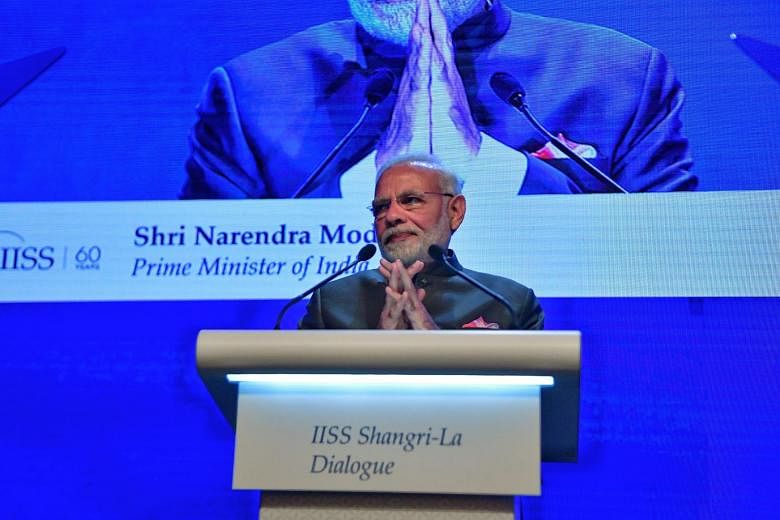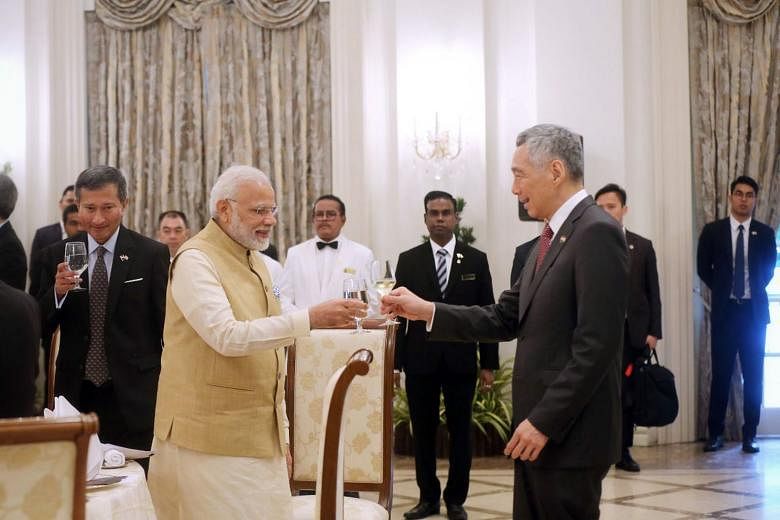The much-anticipated speech where Indian Prime Minister Narendra Modi was expected to outline his "Indo-Pacific" vision should please the region's policymakers.
Mr Modi positioned South-east Asia at the centre of the Indo-Pacific and its unity as crucial to regional stability.
At a time when the ascendance of China has upended the decades-old world order and rising protectionism in the United States has unsettled the trade-based premise of prosperity, Mr Modi held up Asean as a region that had risen above rivalries to work together.
Mr Modi became the first Indian leader yesterday to deliver a keynote address at the opening of the annual Shangri-La Dialogue, attended by Asia-Pacific defence ministers, diplomats and analysts.
He spoke of the "shifts in global power, change in the character of global economy and daily disruption in technology" as the factors that were shaking up the foundations of the global order.
"We live on the edge of uncertainty, of unsettled questions and unresolved disputes; contests and claims; and clashing visions and competing models," he said.
"This is a world of inter-dependent fortunes and failures. And, no nation can shape and secure it on its own. It is a world that summons us to rise above divisions and competition to work together.
"Is that possible?" he asked rhetorically. "Yes. It is possible. I see Asean as an example and inspiration."
He pointed to the region's great diversity of culture, religion, language, governance and economic models and to its history of being sundered by the Cold War.
"Yet, today, Asean has united 10 countries behind a common purpose," he noted.
Describing Asean unity as essential for a stable future for the region, he said "each of us must support it, not weaken it".
He also called for countries to have equal access to shared maritime and air spaces, and for regional disputes to be settled under international law.
"We should all have equal access, as a right under international law, to the use of common spaces on the sea and in the air," he said. "That would require freedom of navigation, unimpeded commerce and peaceful settlement of disputes in accordance with international law. When we all agree to live by that code, our sea lanes will be pathways to prosperity and corridors of peace."
Mr Modi also trod a middle path between the US and China. He made no reference to the "Quad" - a nascent grouping that is said to include the US, Japan, Australia and India to counter a rising China.
He pointedly spoke against protectionism, but without pointing a finger at US President Donald Trump's hawkish trade policies.
At the same time, he offered his support to US policies with his call for "freedom of navigation, unimpeded commerce and peaceful settlement of disputes in accordance with international law".
In a veiled attack on China, he criticised governments that put other nations under "impossible burdens of debt" - an unnamed reference to China's infrastructure projects in South Asia and Africa that have led to unsustainable loans.
At the same time, the relationship between India and China is key to a positive future, he noted. "Asia and the world will have a better future when India and China work together in trust and confidence, sensitive to each other's interests."
His remarks came a month after he met Chinese President Xi Jinping in April, when both promised to reduce border tensions after a stand-off in the Himalayas last year.
In the audience yesterday was Professor C. Raja Mohan, director of the Institute of South Asian Studies, who wrote a book on Mr Modi's foreign policy. Three messages from Mr Modi's articulation of India's approach to the Indo-Pacific stood out, he said. These are Asean centrality, strong support for a rules-based order and peaceful resolution of disputes, and strong support for connectivity with an insistence that they must be based on equality, respect for sovereignty and mutual economic benefit.




